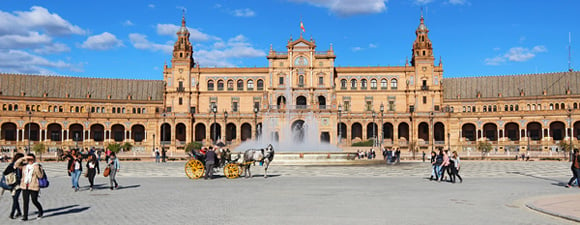Real Estate in Seville, Spain
Last updated on Jan 10, 2025
Summary: Expats and retirees talk about real estate in Seville, Spain? How do you find a home in Seville? Should you buy or rent? What is the cost of housing?

How do I find a place to live in Seville?
We asked expats how they chose their neighborhood and found a place to live. They answered:
"Finding a place to live in Seville, involves several steps. First, you need to determine your budget and the type of accommodation you're looking for. This could range from a small apartment to a larger house, depending on your needs and financial situation. Next, you should research the different neighborhoods in Seville to find one that suits your lifestyle and preferences. Some popular areas include the historic center, Triana, and Nervión. Each neighborhood has its own unique character and amenities, so it's important to visit them in person if possible. Once you've narrowed down your options, you can start searching for available properties. There are several online platforms that list rentals and properties for sale in Seville, such as Idealista, Fotocasa, and Pisos.com. These websites allow you to filter your search based on location, price, size, and other features. In addition to online searches, you might also consider hiring a real estate agent. They can provide valuable local knowledge and help you navigate the Spanish property market. However, keep in mind that this service usually comes at a cost. When you find a property you're interested in, arrange a viewing with the landlord or real estate agent. This is your opportunity to inspect the property and ask any questions about the terms of the lease or sale. If you decide to proceed with a rental, you'll typically need to provide some documentation, such as proof of income and a copy of your passport. You'll also need to pay a deposit, usually equivalent to one or two months' rent. Finally, make sure to read the contract carefully before signing. It should clearly state the rental price, the duration of the lease, the conditions for renewing or terminating the contract, and the responsibilities of both the tenant and the landlord. If you're not fluent in Spanish, it might be worth getting a translation to ensure you fully understand the terms. Remember, finding a place to live in a new city can take time, so it's a good idea to start your search well in advance of your move," remarked one foreigner who made the move to Seville.
 AGS Worldwide Movers
AGS Worldwide MoversGet Quote
Relocating abroad soon? Make your move with AGS! AGS Worldwide Movers is a leader in the international moving industry. Our experience and expertise allows us to guarantee our clients the best quality moving services.
 AGS Worldwide Movers
AGS Worldwide MoversRelocating abroad soon? Make your move with AGS! AGS Worldwide Movers is a leader in the international moving industry. Our experience and expertise allows us to guarantee our clients the best quality moving services.
Get Quote
What is a typical expat home or apartment like in Seville?
"A typical expat home or apartment in Seville, is often located in the city center or in the charming neighborhoods of Triana or Los Remedios. These homes are usually within walking distance to local markets, cafes, and tapas bars. The architecture is typically Andalusian, with white-washed walls, high ceilings, and often features such as wooden beams and traditional tiles. The apartments are usually fully furnished, with a mix of modern and traditional Spanish decor. They often have one to three bedrooms, a living room, a fully equipped kitchen, and one or two bathrooms. Some apartments may also have a small balcony or terrace, offering views of the city's historic landmarks or the picturesque streets. Air conditioning is a common feature due to Seville's hot summers, and heating is also available for the cooler winter months. Many expat homes also have access to a communal swimming pool, a common feature in Seville's residential buildings. Despite being in the city, it's not uncommon for homes to be located in quiet, peaceful areas, offering a respite from the hustle and bustle. Many expats choose to live in apartments within gated communities for added security. In terms of style, many expats are drawn to the charm of Seville's older, traditional homes. However, there are also plenty of modern, newly-built apartments available for those who prefer a more contemporary living space. Overall, a typical expat home in Seville offers a comfortable and convenient base to enjoy the city's rich culture, delicious cuisine, and vibrant lifestyle," explained one expat living in Seville, Spain.
What is the average cost of housing in Seville?
If you are thinking about moving to Seville, cost of living in probably a key consideration. Expats commented about the cost of housing:
"The average cost of housing in Seville can vary greatly depending on the location and size of the property. As of 2021, the average price for a property in the city center is typically around €2,500 per square meter. For a property outside the city center, the average price drops to around €1,700 per square meter. Therefore, a 100 square meter apartment in the city center would cost around €250,000, while the same size apartment outside the city center would cost around €170,000. However, these are just averages and actual prices can be higher or lower," explained one person living in Seville, Spain.
Should I buy or rent a home in Seville?
If you have not spent a lot of time in Seville, you should rent before even thinking about buying. We asked expats there about the buy vs. rent decision:
"The decision to buy or rent a home in Seville, largely depends on your personal circumstances, financial situation, and long-term plans. If you plan to stay in Seville for a long period, buying a home could be a good investment. Owning a property allows you to build equity over time and could potentially provide a return on investment if property values increase. On the other hand, renting might be a better option if you're not planning to stay in Seville for a long time. Renting offers more flexibility, as you can move without the hassle of selling a property. It also allows you to avoid the responsibilities and costs that come with homeownership, such as maintenance, repairs, and property taxes. Financially, buying a home requires a significant upfront cost, including a down payment and closing costs. However, monthly mortgage payments could potentially be lower than rent payments, depending on the property and the terms of your loan. Renting, on the other hand, typically involves lower upfront costs, but you won't build equity or potentially benefit from rising property values. Consider the stability of your income as well. If your income is stable and you can comfortably afford the costs associated with homeownership, buying could be a good option. If your income is less stable, or if you prefer to avoid the financial risk associated with owning property, renting might be a better choice. Lastly, consider your lifestyle and personal preferences. If you value the freedom to customize your living space and don't mind the responsibilities of homeownership, buying a home could be right for you. If you prefer the flexibility to move easily and don't want to deal with maintenance and repairs, renting might be a better fit. In conclusion, both buying and renting have their pros and cons, and the best choice depends on your individual circumstances and goals. It's important to carefully consider your options and perhaps seek advice from a financial advisor or real estate professional before making a decision," said one expat who made the move to Seville.
About the Author
 Joshua Wood, LPC is one of the Founders of Digital Nomad Exchange and serves as Co-President of Expat Exchange. Prior to Expat Exchange and Digital Nomad Exchange, Joshua worked for NBC Cable (MSNBC and CNBC
Primetime). Joshua has a BA from Syracuse and a Master's in Clinical and Counseling Psychology from Fairleigh Dickinson University. Mr. Wood is also a licensed counselor and psychotherapist.
Joshua Wood, LPC is one of the Founders of Digital Nomad Exchange and serves as Co-President of Expat Exchange. Prior to Expat Exchange and Digital Nomad Exchange, Joshua worked for NBC Cable (MSNBC and CNBC
Primetime). Joshua has a BA from Syracuse and a Master's in Clinical and Counseling Psychology from Fairleigh Dickinson University. Mr. Wood is also a licensed counselor and psychotherapist.
Some of Joshua's articles include Pros and Cons of Living in Portugal, 10 Best Places to Live in Ireland and Pros and Cons of Living in Uruguay. Connect with Joshua on LinkedIn.
![]() Spain Forum
Spain Forum
Talk with other digital nomads and expats in Spain on our Spain forum - meet people, get advice and help others.
![]() Contribute
Contribute
Help others in Spain by answering questions about the challenges and adventures of living in Spain.
Digital Nomads in Spain offer advice about healthcare, hospital visits, emergency rooms visits, finding a doctor and buying health insurance in Spain.

 Seville, Spain
Seville, Spain



